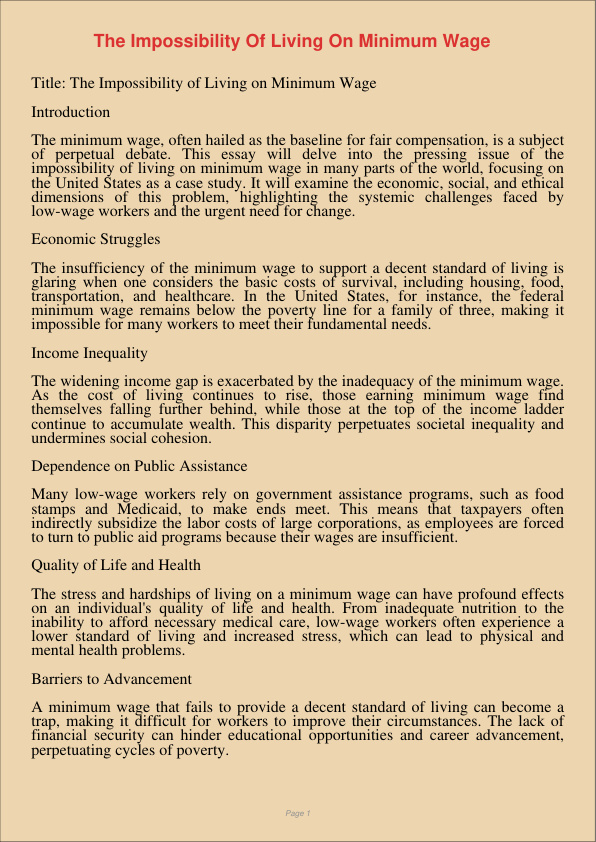Title: The Impossibility of Living on Minimum Wage
Introduction
The minimum wage, often hailed as the baseline for fair compensation, is a subject of perpetual debate. This essay will delve into the pressing issue of the impossibility of living on minimum wage in many parts of the world, focusing on the United States as a case study. It will examine the economic, social, and ethical dimensions of this problem, highlighting the systemic challenges faced by low-wage workers and the urgent need for change.
Economic Struggles
The insufficiency of the minimum wage to support a decent standard of living is glaring when one considers the basic costs of survival, including housing, food, transportation, and healthcare. In the United States, for instance, the federal minimum wage remains below the poverty line for a family of three, making it impossible for many workers to meet their fundamental needs.
Income Inequality
The widening income gap is exacerbated by the inadequacy of the minimum wage. As the cost of living continues to rise, those earning minimum wage find themselves falling further behind, while those at the top of the income ladder continue to accumulate wealth. This disparity perpetuates societal inequality and undermines social cohesion.
Dependence on Public Assistance
Many low-wage workers rely on government assistance programs, such as food stamps and Medicaid, to make ends meet. This means that taxpayers often indirectly subsidize the labor costs of large corporations, as employees are forced to turn to public aid programs because their wages are insufficient.
Quality of Life and Health
The stress and hardships of living on a minimum wage can have profound effects on an individual’s quality of life and health. From inadequate nutrition to the inability to afford necessary medical care, low-wage workers often experience a lower standard of living and increased stress, which can lead to physical and mental health problems.
Barriers to Advancement
A minimum wage that fails to provide a decent standard of living can become a trap, making it difficult for workers to improve their circumstances. The lack of financial security can hinder educational opportunities and career advancement, perpetuating cycles of poverty.
Ethical Considerations
The ethical dimensions of the minimum wage debate are clear. It is a moral imperative to ensure that individuals who work full-time are able to support themselves and their families without relying on public assistance. Paying a living wage is a matter of basic fairness and human dignity.
Conclusion
The impossibility of living on minimum wage is a pressing issue that affects millions of low-wage workers in the United States and around the world. It is not just an economic problem but a social and ethical one as well. Inadequate minimum wages perpetuate income inequality, limit opportunities for advancement, and force many into poverty and dependence on public assistance. Addressing this issue requires a comprehensive approach, including raising the minimum wage, indexing it to the cost of living, and pursuing policies that promote economic equity and social justice. It is a matter of fundamental fairness to ensure that all workers are compensated at a level that allows them to live with dignity and security.

「真诚赞赏,手留余香」
真诚赞赏,手留余香
使用微信扫描二维码完成支付
